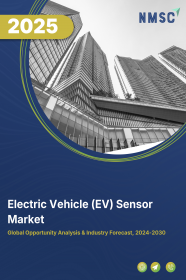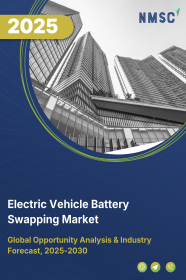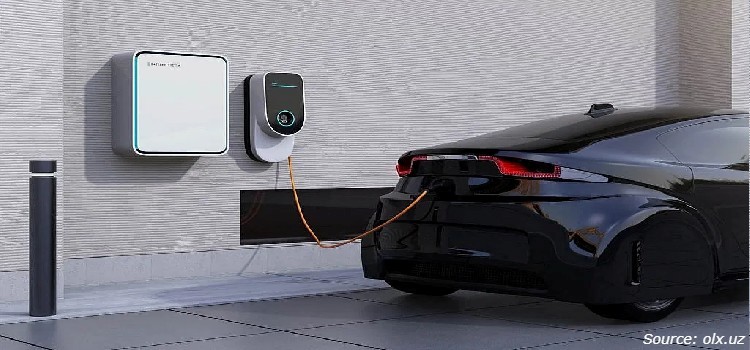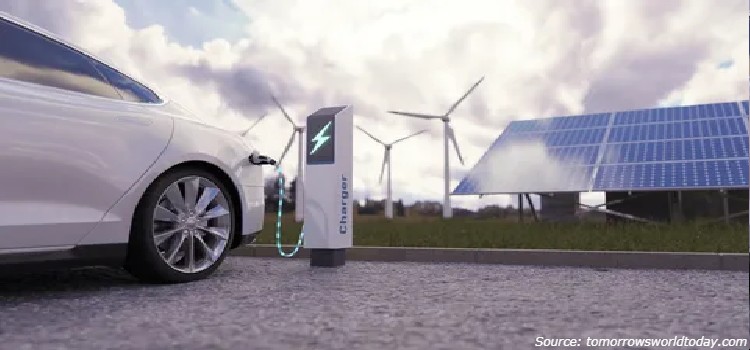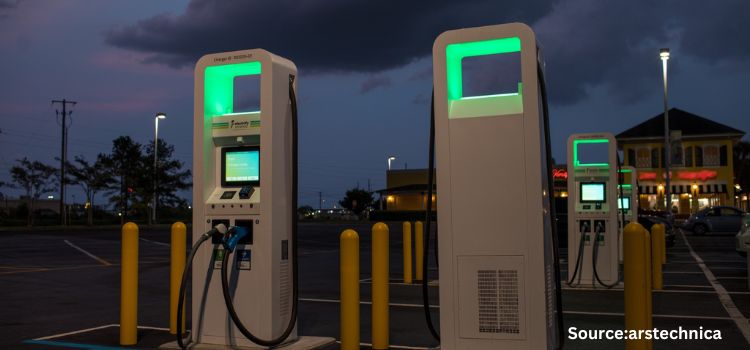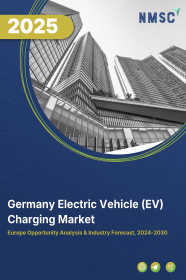
Germany Electric Vehicle (EV) Charging Market By Type of Charger (AC Chargers, and DC Chargers), By Charging Speed (Level 1, Level 2, and Level 3), By Connector Type (J1772 (Type 1), Mennekes (Type 2), CCS (Combined Charging System), CHAdeMO, and Others), By Charging Modes (Mode 1, Mode 2, Mode 3, and Mode 4), By Installation (Fixed and Portable), and By End User (Commercial and Residential) – Opportunity Analysis and Industry Forecast 2023–2030
Industry: Automotive & Transportation | Publish Date: 05-Feb-2025 | No of Pages: 141 | No. of Tables: 106 | No. of Figures: 51 | Format: PDF | Report Code : AT850
US Tariff Impact on Germany Electric Vehicle (EV) Charging Market
Trump Tariffs Are Reshaping Global Business
Market Definition
Germany Electric Vehicle (EV) Charging Market was valued at USD 1.28 billion in 2022, and is predicted to reach USD 9.12 billion by 2030, with a CAGR of 28.6% from 2023 to 2030. Electric vehicle chargers are defined by the amount of energy delivered to the vehicle’s battery per unit of time. It is an infrastructure that is used to connect the plug-in electric vehicle to an electrical outlet to charge the battery of the vehicle. Electric vehicle chargers are used to provide charging to EVs with a battery and the electrical source that helps to charge the battery.
Electric vehicles, neighborhood EVs, and plug-in hybrids can all be charged at a charging station by connecting to an electrical source. Advanced features including smart meters, cellular connectivity, and network access are available on some charging stations.
The charging of EVs can be carried out through several levels of charging such as level 1, level 2, and level 3. The higher the level of charging, the faster the charging process causing more power to be delivered to the vehicle. The use of electric vehicles significantly reduces the carbon footprints released into the atmosphere, which contain toxic gas. The growing threat of carbon emissions and other harmful gases stemming from transportation has triggered the vital necessity of adopting electric vehicles.
In addition, the penetration of EV charging is high in commercial spaces as compared to residential ones. Long-distance trips would benefit from ultra-fast charging capabilities made possible by public charging infrastructure. However, EV chargers for residential spaces offer significant growth potential as they are affordable and more convenient for charging electric vehicles as compared to commercial charging stations.
Key Innovators Drive Growth in Germany's EV Charging Market
The growth of the electric vehicle (EV) charging market in Germany is being significantly driven by key players such as ABB, Shell, and Tesla, among others, who are actively involved in innovating and advancing EV charging stations. Their contributions are making it easier and more accessible for people to charge their EVs, fostering the EV adoption journey in the country.
For instance, in August 2022, Mercedes-Benz Trucks launched 'all in one' charging station in Germany. Six charging stations from various manufacturers are located in the charging park, and their output ranges from 40 kW to 300 kW. The Megawatt Charging System (MCS) has been developed for heavy-duty vehicles.
Additionally, in May 2022, ABB and Shell launched the first nationwide network of the world’s fastest EV charger ‘Terra 360’ to ensure increased charger availability and charging speed for more than 1.7 million German electric car drivers by launching over 200 Terra 360 chargers across Germany in the upcoming 12 months.
German Government's Green Initiatives: Driving EV Adoption and Sustainable Mobility
The German government is taking proactive measures to combat climate change by vigorously advocating for the widespread adoption of electric vehicles (EVs). Their comprehensive approach includes a range of incentives designed to make EV ownership financially appealing, such as subsidies, tax reductions, and lowered registration fees, which incentivize consumers to transition to cleaner transportation options.
Simultaneously, Germany has imposed strict emissions standards and congestion charges in urban areas, providing additional motivation for individuals to opt for electric mobility. This multifaceted strategy not only promotes a cleaner environment but also aligns with broader goals of reducing carbon emissions and fostering sustainable and eco-friendly transportation solutions throughout the country.
Fast Chargers' High Initial Setup Costs Hinder the EV Charging Market Growth
High installation costs and the absence of incentives pose significant challenges to the growth of the EV charger installation sector. The primary hurdle lies in the expensive nature of level 3 and ultra-fast chargers, which raises concerns among potential users. Unlike level 1 and level 2 chargers, which take several hours for a full charge, consumers expect speedy refuelling similar to traditional gasoline vehicles, typically within 5 to 7 minutes.
There is a strong demand for fast chargers capable of charging EVs in under 30 minutes. However, the initial expense of level 3 chargers can deter those considering the switch to EVs. The lengthy charging times could disrupt individuals' busy schedules, making convenience a critical factor to consider.
Surging Adoption of Vehicle-to-Grid (V2G) EV Charging Stations in Germany Unlocks Promising Opportunities
A technology called vehicle-to-grid (V2G) EV charging allows plug-in EVs and the power grid to exchange electrical energy in both directions. Electric vehicles (EVs) can store extra electricity and release it to the grid thanks to V2G technology. This may enhance the functionality of the electrical component and increase value for EV owners.
The development of this concept has made charging for electric vehicles easier, and EVs are now among people's top transportation options. As a result, the entire market for charging stations is essential for connecting the electric vehicle to the grid and enabling the vehicle to charge.
Two V2G EV vehicle charging stations were erected by Enel Energia S.p.A. at the Italian Institute of Technology's Genoa headquarters. The installation is a part of MOV-E, a Nissan-sponsored corporate electric car sharing trial project. The Italian Institute of Technology received two battery electric vehicles (LEAF models) from Nissan as well as the Glide app management platform. The partnership between Enel and Nissan represents a shift in the way that technology is used for sustainable transportation.
As a result, manufacturers have a great chance with the V2G charging technology because it is predicted to change the EV industry and determine how EVs will be charged in the future. Although V2G infrastructure is more beneficial than smart charging, installing V2G charging stations has a hefty up-front cost. Manufacturers of EV connectors are projected to have opportunities to produce sophisticated connectors to withstand electrical architecture due to the predictable and anticipated expansion of V2G technology.
Competitive Landscape
The Germany Electric Vehicle (EV) Charging industry includes several market players such as Schneider Electric, Siemens, XCharge Europe, ChargePoint, Inc., Tesla Inc., ABB, Allego BV, BP PLC (Pulse), Fortum, WallBox Inc., EVBox , Shell Plc., BMW AG, Heliox Energy and EnBW Baden Württemberg AG..
Key Benefits
-
The Germany Electric Vehicle (EV) Charging market report provides a quantitative analysis of the current market and estimations through 2023-2030 that assists in identifying the prevailing market opportunities to capitalize on.
-
The study comprises a deep dive analysis of the market trend including the current and future trends for depicting the prevalent investment pockets in the market.
-
The information related to key drivers, restraints, and opportunities and their impact on the market is provided in the report.
-
The competitive analysis of the market players along with their market share in the Germany Electric Vehicle (EV) Charging market.
-
The SWOT analysis and Porter’s Five Forces model are elaborated in the study.
-
Value chain analysis in the market study provides a clear picture of the stakeholders’ roles.
Germany Electric Vehicle (EV) Charging Market Key Segments
By Type of Charger
-
AC Chargers
-
DC Chargers
By Charging Speed
-
Level 1
-
Level 2
-
Level 3
By Connector Type
-
J1772 (Type 1)
-
Mennekes (Type 2)
-
CCS (Combined Charging System)
-
CHAdeMO
-
Others
By Charging Modes
-
Mode 1
-
Mode 2
-
Mode 3
-
Mode 4
By Installation
-
Fixed
-
Portable
By End User
-
Commercial
-
Commercial Public EV Charging Stations
-
Highway Charging Stations
-
Fleet Charging Stations
-
Workplace Charging Stations
-
-
Commercial Private EV Charging Stations
-
-
Residential
Key Players
-
Schneider Electric
-
Siemens
-
XCharge Europe
-
ChargePoint, Inc.
-
Tesla Inc.
-
ABB
-
Allego BV
-
BP PLC (Pulse)
-
Fortum
-
WallBox Inc.
-
EVBox
-
Shell Plc.
-
BMW AG
-
Heliox Energy
-
EnBW Baden Württemberg AG.
REPORT SCOPE AND SEGMENTATION:
|
Parameters |
Details |
|
Market Size in 2022 |
USD 1.28 Billion |
|
Market Volume in 2022 |
116 Thousand Units |
|
Revenue Forecast in 2030 |
USD 9.12 Billion |
|
Growth Rate |
CAGR of 28.6% from 2023 to 2030 |
|
Analysis Period |
2022–2030 |
|
Base Year Considered |
2022 |
|
Forecast Period |
2023–2030 |
|
Market Size Estimation |
Billion (USD) |
|
Growth Factors |
Emergence of key market players The increasing government initiatives. |
|
Companies Profiled |
10 |
|
Market Share |
Available for 10 companies |
|
Customization Scope |
Free customization (equivalent up to 80 working hours of analysts) after purchase. Addition or alteration to country, regional, and segment scope. |
|
Pricing and Purchase Options |
Avail customized purchase options to meet your exact research needs. |

















 Speak to Our Analyst
Speak to Our Analyst



